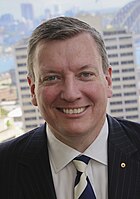New South Wales general election, 2003
|
|
||||||||||||||||||||||||||||||||||
|---|---|---|---|---|---|---|---|---|---|---|---|---|---|---|---|---|---|---|---|---|---|---|---|---|---|---|---|---|---|---|---|---|---|---|
|
||||||||||||||||||||||||||||||||||
|
All 93 seats in the New South Wales Legislative Assembly and 21 (of the 42) seats in the New South Wales Legislative Council 47 Assembly seats were needed for a majority |
||||||||||||||||||||||||||||||||||
|
||||||||||||||||||||||||||||||||||

Legislative Assembly after the election
|
||||||||||||||||||||||||||||||||||
|
||||||||||||||||||||||||||||||||||
Elections to the 53rd Parliament of New South Wales were held on Saturday 22 March 2003. All seats in the Legislative Assembly and half the seats in the Legislative Council were up for election. The Australian Labor Party led by Bob Carr won a third four-year term against the Liberal-National Coalition led by John Brogden.
In the 18 months following the 1999 election politics was swamped by the Olympics. The only problem in this period was an administrative disaster in organising the ballot to purchase tickets. Games organisers were trying to hold back tickets originally promised at a lower price to the public in an attempt to deal with the financial viability of the Olympics. Chikarovski remained as Liberal leader after the 1999 election, partly because no-one wanted the job before the Olympics, but also because there was no clear alternative. A challenge finally occurred in March 2002, and Pittwater MP John Brogden, after six years in Parliament, was elected to the leadership on his 33rd birthday.
After the Olympics, the Government faced two major problems. The first was the police. The Government had appointed an outsider, Englishman Peter Ryan, as new Commissioner to implement the reforms proposed by the Police Royal Commission. By 2001, police issues had moved on from corruption and returned to law and order, with the Government in particular under pressure over so-called "ethnic" crime in Western Sydney. Both Police Minister Paul Whelan and Commissioner Ryan were pushed into retiring, and new Minister Michael Costa was brought in to control the issue in the run-up to the 2003 election.
The second problem was the rail system. In a bid to create efficiencies, the Government had split the rail system into distinct organisations covering track, rolling stock, freight and passengers. Following a spate of accidents, including fatalities at Springwood in December 1999, a commission of inquiry was appointed. Its findings were that the accidents stemmed from confusion in the new structure of the rail system, and also a failure by the railway organisation to view safety as an operational goal. Another accident at Waterfall a month before the official start of the election campaign looked set to make rail safety a critical election issue, but the cause turned out to be the demise of the driver at the controls. Events after the election were to reveal major problems in the rail system, but they were not to become major issues in the campaign.
...
Wikipedia


